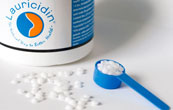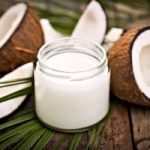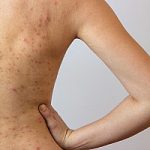How Effective is Coconut Oil for Herpes?

Can you really use coconut oil to treat herpes?
Research shows coconut oils contain a fatty acid with anti-viral properties that may help reduce symptoms, but there’s debate on it’s actual effectiveness.
Traditional remedies used to treat herpes include anti-viral medications (such as Acyclovir) and over-the counter creams and lotions.
While many of these products can effectively reduce outbreaks, some medications may cause unwanted side effects, including nausea, vomiting, gastrointestinal effects and headaches.
Consumers seeking gentler, and more natural treatment options may try altering their diet or using nutritional supplements.
Coconut oil has gain popularity over the years as a healthy oil with many health benefits.
This article will take a closer look at the active ingredients found in coconut oils and their use in treating herpes symptoms.
What is Herpes?
A fact sheet on herpes from the World Health Organization states that it’s an infection caused by the Herpes Simplex Virus (HSV).
HSV is a family of viruses that includes Epstein-Barr Virus and Varicella-Zoster Virus.
Epstein-Barr causes Mononucleosis, also known as ‘kissing disease’, and Varicella-Zoster can cause Shingles and Chicken Pox.
There are actually variations of the herpes virus with Herpes Simplex Virus Type 1 (HSV-1) and Herpes Simplex Virus Type 2 (HSV-2) causing the majority of infections.

Herpes Lesion
Herpes Simplex Type 1 primarily causes oral lesions and Herpes Simplex Type 2 causes genital lesions.
However, these viruses are not typically unique with regards to symptoms, and some individuals infected with the Herpes Simplex Simplex 1 may also exhibit genital sores.
The virus is easily spread from person-to-person during an active outbreak. You can even spread the virus a few days before an outbreak. Most people with herpes may not show any symptoms, and yet it’s still possible to infect another person. This stage is called ‘Asymptomatic Shedding’.
People that exhibit recurrent lesions and skin eruptions may need to go on long-term anti-viral medications such as Zovirax (Acyclovir) and Valtrex (Valacyclovir).
These medications have been proven effective for destroying the herpes virus and suppressing outbreaks. Side effects (although rare) may include seizures, diarrhea, headaches and nausea.
Recent lab studies have shown that a fatty acid found in coconut oil can neutralize the herpes virus.
Coconut Oil has Anti-Viral Properties

Coconut oil is a natural source of the medium chain triglycerides, Lauric and Capric acid.
Research on lauric acid and capric acid shows they form the building blocks of ingredients that have powerful antimicrobial properties which are effective against certain bacteria and fungi.
When properly metabolized, both lauric acid and capric acid change into monoglycerides (a glycerol molecule) called Monolaurin and Monocaprin.
Additional research on lauric acid and monolaurin shows they are potent anti-virals. Scientists discovered they effectively kill lipid-coated viruses (such as Herpes, HIV, and Cytomegalovirus) by destroying the lipid membrane of the pathogen, causing them to disintegrate.
Depending on the type of coconut oils you buy, you can get up to 40 – 50% lauric acid and 8 – 10 % capric acid.
Can You Really Use Coconut Oil for Herpes?
Research shows that coconut oil is a natural source of the base ingredients for anti-microbial agents.
However, using coconut oil for herpes may involve a lot more than taking a couple of spoonfuls of coconut oil.
Important factors scientists must consider are:
What’s the correct dose of coconut oil to achieve therapeutic levels of lauric acid in your body?
How much lauric acid actually converts into monolaurin to achieve an effective anti-viral response?
At press time, there’s currently debate between some natural health advocates and scientific researchers….
The Weston A. Price Foundation, a non-profit organization dedicated to restoring nutrient-dense foods to our diets, suggests people infected with herpes eat as much coconut oil as possible to maximize lauric acid levels in the body.
Other health food advocates recommend starting with 2 – 3 tablespoon of virgin coconut oil per day and then slowly increasing the dosages until symptoms subside.
Leading Researcher Disagrees with Using Coconut Oil for Herpes
Dr. Jon Kabara, a leading researcher credited with pioneering research on the antibacterial properties of monolaurin, believes it’s pointless eating coconut oil to treat herpes symptoms.
He claims that the human body isn’t very efficient at converting lauric acid into the anti-viral monolaurin.
His research shows that you’d need at least 3 – 9 grams a day of monolaurin to have any antiviral effect in the body.
A person would need to eat about 300 to 900 ml. of coconut oil a day in order to achieve therapeutic levels of monolaurin, which is probably possible.
Therefore, the most effective way to get sufficient amounts of dietary monolaurin and monocaprin is by taking it in supplement form.
Based on his research, Dr. Kabara created a monolaurin supplement called Lauricidin Pure Monolaurin.

Lauricidin Supplement
Studies indicate that taking one (1) dose of Lauricidin is equivalent to consuming many tablespoons of coconut oil.
Dr. Kabara’s recommended dosage to suppress herpes outbreaks is 1/2 to 1 scoop per day. He recommends people start with a single dose and slowly increase it to gauge its effectiveness.
Lauricidin product reviews appear to be favorable. At press time, about 515 customers gave it 4.6 out of 5 Stars with claims it effectively treated herpes outbreaks, candida and yeast infections. Other people have reported no further herpes flare-ups since starting a regimen of Lauricidin.
You may need to take monolaurin supplements daily in order to maintain its effectiveness and there have been no reported side effects from long term use.
Conclusions:
How effective coconut oil is for treating herpes may be up for debate.
While there’s currently no cure for herpes, there are many natural treatments available that may help suppress your outbreaks and reduce symptoms.
Some natural health advocates have discussed using tea tree oil on herpes and other healthy oils, including oregano oil.
And while there are reports from people claiming coconut oil helped treat their herpes, there’s currently no double-blind, placebo-controlled human studies supporting the theory that ingesting the oil will lessen your symptoms.
Nevertheless, many natural health followers and medical professionals agree that optimizing one’s diet and making positive lifestyle changes can help enhance the immune system and may reduce herpes outbreaks.
Studies show that some naturally-derived products, such as Lysine and Monolaurin supplements, may also help lessen herpes symptoms and provide relief.
Research References:
Fatty Acids and Derivatives as Antimicrobial Agents Antimicrobial Agents and Chemotherapy 2(l):23-28 (1972) Kabara. J.J.. Conley. A J.- Swieczkowski. D M. Ismail, I.A . Lie Ken Jie and Gunstone, F D Antimicrobial Action of Isomeric Fatty Acids on Group A Streptococcus Journal of Medicinal Chemistry 16:1060-1063 (1973).
Antimicrobial Lipids: Natural and Synthetic Fatty Acids and Monoglycerides. Kabara. J.J., Vrable, R. and Lie Ken Jie, M.S.F Lipids 12:753759 (1977).
Toxicological, Bactericidal and Fungicidal Properties of Fatty Acids and Some Derivatives Kabara, J.J. JAOCS 56:760-767
Lauric oils as antimicrobial agents: theory of effect, scientific rationale, and dietary applications as adjunct nutritional support for HIV-infected individuals in Nutrients and Foods in AIDS (RR Watson, ed) CRC Press, Boca Raton, 1998, pp. 81-97. Enig, MG
Home Page > Coconut Oil Home Page > How Effective is Coconut Oil for Herpes?





